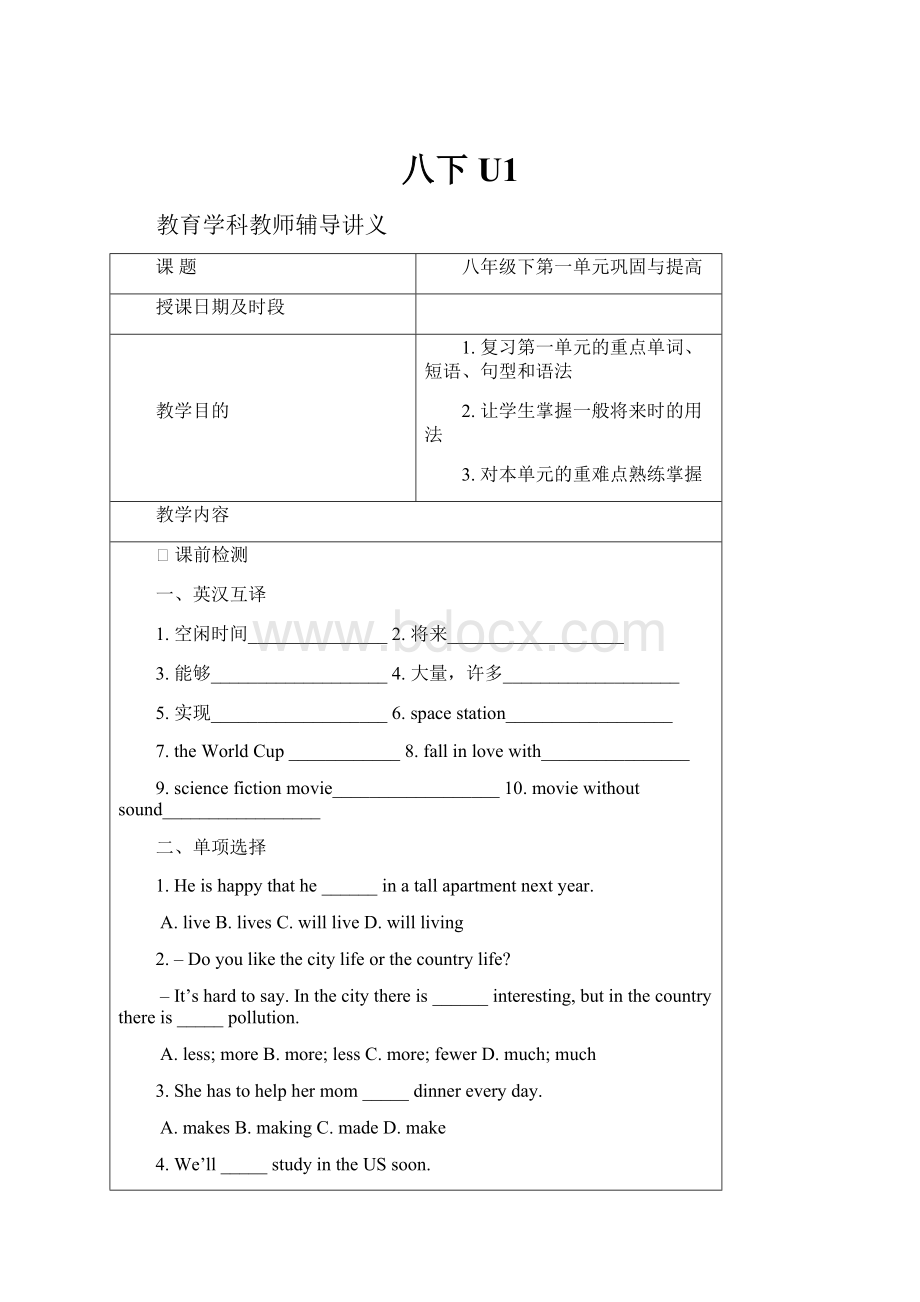 八下U1.docx
八下U1.docx
- 文档编号:12476402
- 上传时间:2023-04-19
- 格式:DOCX
- 页数:17
- 大小:28.54KB
八下U1.docx
《八下U1.docx》由会员分享,可在线阅读,更多相关《八下U1.docx(17页珍藏版)》请在冰豆网上搜索。

八下U1
教育学科教师辅导讲义
课题
八年级下第一单元巩固与提高
授课日期及时段
教学目的
1.复习第一单元的重点单词、短语、句型和语法
2.让学生掌握一般将来时的用法
3.对本单元的重难点熟练掌握
教学内容
Ø课前检测
一、英汉互译
1.空闲时间_______________2.将来___________________
3.能够___________________4.大量,许多___________________
5.实现___________________6.spacestation__________________
7.theWorldCup____________8.fallinlovewith________________
9.sciencefictionmovie__________________10.moviewithoutsound_________________
二、单项选择
1.Heishappythathe______inatallapartmentnextyear.
A.liveB.livesC.willliveD.willliving
2.–Doyoulikethecitylifeorthecountrylife?
–It’shardtosay.Inthecitythereis______interesting,butinthecountrythereis_____pollution.
A.less;moreB.more;lessC.more;fewerD.much;much
3.Shehastohelphermom_____dinnereveryday.
A.makesB.makingC.madeD.make
4.We’ll_____studyintheUSsoon.
A.canB.couldC.beableD.beableto
5.Therearetoomanypredictionsthatnever______.
A.comestrueB.cametrueC.cametruthD.comestruly
Ø知识梳理
1.–Willpeopleusemoneyin100years?
–No,theywon’t.Everythingwillbefree.
(1)will+动词原形是一般将来时的主要表现形式,当主语是第一人称时,也可以用shall代替will。
will和主语可以一起缩写,如:
I’ll,we’ll,they’ll,she’ll等。
(2)一般将来时表示在将来某一时间要发生的动作或存在的状态,或将来某一时间内经常的动作或状态。
例如:
I’llcomehereinanhour.
(3)含will的一般将来时变一般疑问句,将will提到句首。
否定句在will后加not,或缩写为won’t。
同步练习:
用所给词的适当形式填空
1.We__________(go)fishingtomorrow.
2.They__________(notgo)tomoviesthedayaftertomorrow.
3.--_____you__________(goout)forawalktonight?
--No,I_____.
2.Therewillbemorepollution.
(1)Therebe句型的一般将来时:
Therewillbe…
否定形式,Therewon’t(willnot)be…
疑问句形式,Willtherebe…?
肯定回答:
Yes,therewill./否定回答:
No,therewon’t.
例句:
Therewillbeasportsmeetingnextweek.Willyougowithme?
Sorry,Iwon’tgowithyou.Ihavealotofhomeworktodo.
同步练习,单选
1.–Willtherebemorepeoplein50years?
--________,Ihope.
A.No,thereisn’tB.No,therearen’tC.No,therewon’tD.No,theywon’t
2.Howmanypeople______therefiftyyearsago?
A.willB.wereC.areD.willbe
3.There_____abirthdaypartythisSunday.
A.willhaveB.willbeC.isgoingtohaveD.willgoingtobe
(2)little,alittle,few,afew,more,less,fewer
little
几乎没有,否定意义
修饰不可数名词
alittle
少数,有一些
few
几乎没有,否定意义
修饰可数名词
afew
少数有一些
more
更多,many和much的比较级
修饰名词复数或不可数
less
更少,little的比较级
修饰不可数名词
fewer
更少,few的比较级
修饰可数名词复数
同步练习,用以上几个词填空
1.Therewillbe________________(更少的时间)forus.
2.Weonlyhave______orangejuice,solet’sbuysometomorrow.
3.Thereare_____peoplecomingtotheparty.It’stooquiet.
4.Therewillbe________________(更多的图书馆)inourcitynextyear.
5.Kidswillhave_________________(更少的计算机)intheirclassroom.
(3)pollution是名词,意思为“污染”,其动词形式是pollute,是及物动词
同步练习,单词填空
Don’t_______thewater.
Toomuch______will_______ourbeautifulenvironment.
3.Iagree./Idon’tagree.
agreev.同意,赞成。
(1)agreewithsb,表示“同意某人(的意见或是观点)
例句:
Didyouagreewithhim?
Idon’tagreewithyou.
(2)agreetosth,表示“同意某计划、办法、建议或是条件”
例句:
Iquiteagreetoyouridea.Idon’tagreetoyourplan.
同步练习,单词填空
1.--______youagreewithme?
--Yes,weshouldmakethebedourselves.
A.DoB.DidC.AreD.Were
2.–IthinkthatChinawillwintheWorldCuponeday.
--I_____.TheChineseteamisbecomingstrongerandstronger.
A.agreeB.disagreeC.amnotagreeD.think
3.Ithinkpeopleherearefriendly.Doyouagree_____me?
A.withB.toC.onD.from
4.WhatdoyouthinkSallywillbeinfiveyears?
doyouthink在句中通常被用作插入语,意思是“你认为”,它后面部分一般用陈述句语序。
插入语一般是对作适当的附加解释,去掉的话,对整句话的意思没有多大影响。
若把插入语提到句子的前部去,它就会成为句子的主要部分,而原来的主要部分则成为一个从句。
如:
Whendoyouthinkshewillcomeback?
Doyouthinkwhenshewillbecomeback?
同步练习,单词填空
1.Whatdoyouthink_______?
A.TomlikebestB.doesTomlikebestC.TomlikesbestD.willTomlikebest
2.Where______theywillgoforthevacation?
A.doyoulikeB.asforyouC.asyouwantD.doyouthink
5.IwenttoShanghailastyearandfellinlovewithit.
fallinlovewith表示“喜欢上、爱上”
例句:
Ifellinlovewithheronmyfirstsight.
【补充】fall的其它短语
fallasleep入睡fallbehind落后,跟不上falloff掉下,跌落
同步练习,翻译
1.我爱上了西湖。
I__________________withtheWestLake.
2.他太累了以至于很快就睡着了。
Hewassotiredthathe____________quickly.
3.你应该努力学习,不然你会落后的。
Youshouldstudyhard,oryouwill____________.
6.Idon’tlikelivingalone.
aloneadv.单独地,独自地。
例句:
Thepoorboyhastolivealonebecausehisparentsworkinanothercity.
alone也可以作形容词,表示“单独的”、“独自的”
【注意】alone和lonely的区别
alone做形容词的时候只能做表语,表示“独自,单独”这种客观的情况
lonely是形容词,表示内心感到的“孤独的,寂寞的”
例句:
Lilydoesn’tlikebeingalone,becauseitmakesherfeellonely.
同步练习,用alone或是lonely填空
1.Theoldwomanlives______,butshedoesn’tfeel_____.
2.“I’mathomebymyself.”Means“I’m______athome.”
7.Ontheweekend,I’llbeabletodressmorecasually.
(1)can与beableto均可表示某人做某事的能力,常可互换。
例句:
I’mnotabletoexplainthis.我不能解释这个问题。
Ican’texplainthis.
HewasabletospeakFrenchverywell.他的法语讲得不错。
Hecouldn’tspeakFrenchverywell.
(2)但是两者还是有区别的:
a)从时态形式来看,can只有现在式和过去式(could)两种,而beableto则可根据需要使用多种时态,还可以和一些情态动词连用,或用作动词不定式等非谓语形式。
例如:
Ihaven'tbeenabletosleeprecently.最近我睡不着觉。
Ourbabywillbeabletowalkinafewweeks.我们的宝宝再过几个星期就能走路了。
Youmightbeabletopersuadehim.你也许能够说服他。
Ihopetobeabletodothework.我希望能干得了这项工作。
Iregretnotbeingabletohelpher.我很遗憾未能帮助她。
b)用于现在时,can泛指一般的能力,而beableto则主要指具体做某件事的能力。
例如:
Hecanswim.他会游泳。
Iamabletoexpressmyideainaclearway.我能清楚地表达自己的想法。
c)在表示过去的一般能力时,两者没有很大差别。
例如:
Icould/wasabletoplaythepianowhenIwasyoung.我年轻时会弹钢琴。
但如果要表示"一时的能力",即"在过去某时有某种能力,并顺利地完成某事",则要用was/wereableto,而不能用could。
例如:
Thoughhewassick,hewasabletoswimacrosstheriver.虽然他病了,但他还是游过了河。
Afterfivehoursofclimbing,wewereabletoreachthetopofthemountain.经过5个小时的攀爬,我们终于登上了山顶。
同步练习,根据提示完成句子
1.Robotswill_______________(能)dothesamejobsaspeople.
2.He______(be)able_____(get)goodgradesnextyear.
(3)dressv.穿衣
辨析:
dress,puton,wear,(be)in
dress用来表示“穿”、“戴”时,既可以指动作,又可以指状态
例句:
Shedressedthebaby.
I’mdressedinablueT-shirt.
MrsSmithisdressingupfortheparty.
wear意为穿(衣服);戴(首饰等),表示一种状态。
例句:
Sheiswearingashirt.
Theboywearshisschoolcaptoday.
puton常指穿衣的动作。
例句:
It’sverycoldtoday.Pleaseputonyourcoat.
(be)in指穿着的状态,后面常跟颜色或服装
例句:
Jackisinabluesweater.
Thegirlinpinkismysister.
同步练习,用dress,wear,puton或bein并用其适当形式填空
1.Jim,please_____yourselfquickly.
2.It’sraining.Please_____yourraincoat.
3.Kate_____anewskirttoday.
4.Theboy_____blacktoday.
8.Predictingthefuturecanbedifficult.
此句中,动词短语predictthefuture在句中作主语,因此必须在动词后面加上-ing,使它变为动名词。
predictv.预言、预测、预示(常与that连用),其名词形式为prediction
同步练习,用动词适当形式填空
1._____(drink)milkisgoodforyourhealth.
2._____(think)carefullybeforeyouwritedowntheanswers.
9.TheheadofoneofthebiggestmoviecompaniesintheUnitedStatespredictedthatnoonewouldwanttoseeactorstalk.
(1)oneof后面跟名词的复数,意思为“…之一”,后面有形容词要用最高级形式,表示“最…之一”
例句:
TheYellowRiverisoneofthelongestriversintheworld.
同步练习
1.Sallyisoneofthe_____studentsinmyclass.
A.goodB.betterC.bestD.well
2.Oneofthe______underthetreeismyaunt.
A.teacherB.studentC.teachersD.class
(2)在短语seesb.dosth.,“看到某人做某事”中,do前面必须省掉“to”。
有相同用法的动词还有:
hear听、feel感觉、watch看、notice注意等
感官动词+宾语+do,表示这个动作经常发生或整个过程
例句:
Ioftenseetheoldmandoexerciseinthepark.
Isawhimfalloffthetreejustnow.
感官动词+宾语+doing,表示动作是正在发生的
例句:
Wesawagroupofchildrenplayingsoccerinthestreet.
同步练习,用动词的适当形式填空
1.Listen!
CanyouhearJim_____(sing)nextdoor?
2.SometimesIseeJessica_____(play)volleyballwithherfriends.
Ø重难点突破
1.一般将来时
概念:
一般将来时表示将要发生的动作或存在的状态以及计划、打算做某事
基本用法
a.一般将来时由助动词shall或will加动词原形构成
Shall用于第一人称,will用于第二、三人称
(现在很多说英语的国家,在陈述句中,即使第一人称一般也用will)
Iwillarrivetomorrow.我明天到.
Willyoubebusytoday?
你今晚忙吗?
有时有表示将来时间的状语,有时没有时间状语,这时要从意思上判断是否指未来的动作或情况:
I’llthinkitover.我想一想.
We’llonlystayfortwoweeks.我们只待两个星期.
b.表示将要发生的动作或情况,除了一般将来时外,
还有一些其他结构和时态:
1)begoing+不定式
(表示打算、准备做的事或即将发生和肯定要发生的事):
Howareyougoingtospendyourholidays?
假期你准备怎样过?
Ithinkitisgoingtosnow.我看要下雪了.
2)现在进行时(表示按计划安排要发生的事):
We’rehavinganEnglishpartytonight.
我们今晚将有个英语晚会.
Howareyougoing——byboatorbytrain?
你们怎么去,坐车去还是坐火车去?
但这只限于少量动词,如:
go,come,leave,start,arrive,lunch,return,dine,work,sleep,stay,play,do,have,wear等
c相关知识:
1.表示“存在”的句型
Therebe+主语+其他成分
e.g.:
Thereisabookonthetable.
2.表示“将来存在”的句型
Therewillbe+主语+其他成分
e.g.:
Therewillbemorepeopleinthiscity.
3.表示“将来存在”的疑问句型,否定句型和简略回答
Willtherebe+主语+其他成分?
Yes,therewill./No,therewon’t.
Therewillnot+主语+其他成分.
e.g.:
Willthereberain?
Yes,therewill./No,therewon’t.
Therewon’tberainsoon.
同步练习,根据中文意思填空
1.如果明天下雪,我们就不去那儿了。
We__________thereifit_____tomorrow.
2.她打算星期天再帮助Tim一次。
She____________________TimagainonSunday.
3.这个周末有一次会议。
There__________ameetingthisweekend.
4.“Betty不久会出院吗?
”
“______Bettygetoutofthehospitalsoon?
”
“是的,几天后她就会出院了。
”
“Yes,shewill.She_____getoutofthehospital_________________________.”
5.“你很快会回来吗?
”
“Willyoubebacksoon?
”
“是的,我一周以后回来。
”
“Yes,_____________.I’ll______________________________.”
2.难词辨析
●in&after
相同点:
这两个词后都可接时间,表示“在······以后”
不同点:
1.“in+一段时间”表示以现在为起点的将来一段时间以后,常与将来时连用.
2.“after+一段时间”表示以过去某一时间点开始的一段时间以后,常于一般
过去时连用.当after后接某一时间点时,仍可用于将来时.
同步练习,用in或after填空
1.It’llbefinished_____fiveminutes.
2.Herangyouup______supper.
3.I’llbefree______nineo’clock.
4.It’stwoo’clock.I’llcome_____an
- 配套讲稿:
如PPT文件的首页显示word图标,表示该PPT已包含配套word讲稿。双击word图标可打开word文档。
- 特殊限制:
部分文档作品中含有的国旗、国徽等图片,仅作为作品整体效果示例展示,禁止商用。设计者仅对作品中独创性部分享有著作权。
- 关 键 词:
- U1
 冰豆网所有资源均是用户自行上传分享,仅供网友学习交流,未经上传用户书面授权,请勿作他用。
冰豆网所有资源均是用户自行上传分享,仅供网友学习交流,未经上传用户书面授权,请勿作他用。


 #全自动电容电感测试仪.docx
#全自动电容电感测试仪.docx
